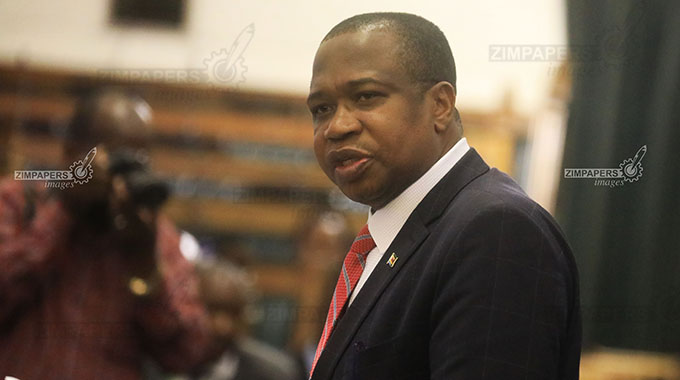Mthuli to unveil new measures

Golden Sibanda Senior Business Reporter
Finance and Economic Development Minister Mthuli Ncube is today expected to present his 2019 Mid-Term Budget Review Statement, amid high expectations for measures to improve disposable incomes, boost production and protect the value of the local currency.
Little to no shock therapy interventions are anticipated from the minister’s Budget review, but measures to facilitate consolidation and the march towards prosperity, after he said recently that major reform measures had been completed.
The Treasury chief is on record as saying following a series of policy reforms since his US$8,2 billion 2019 Budget in November last year, focus shifts towards driving production.
However, a supplementary budget may well be up his sleeve after currency reforms that saw the adoption of a local currency, which has lost ground against major currencies.
The statement comes against the backdrop of foreign currency shortages, high inflation, rolling power outages, low industrial production and the shortage of cash, among other issues which the Budget must speak to.
Minister Ncube’s economic reform measures under the Transitional Stabilisation Programme (TSP) designed to correct ills of the past, have inadvertently made life unbearable for the majority.
These include the separation of nostro and RTGS accounts, liberalisation of the foreign exchange market and fuel procurement, the introduction of 2 percent intermediated money transfer tax, removal of the multi-currency regime and return of the local unit as the sole legal tender.
In the intervening period, Zimbabwe’s annual inflation raced from 5,39 percent in September 2018 to 175,66 percent by June 2019, raising fears of a repeat of the crisis and hyperinflation that rocked the country in the decade to 2008.
Of late, inflation has largely been driven by steep premiums from foreign currency trading on the black market where a number of businesses bought hard currency to import goods; including raw materials used in production.
While the country’s inflation rate has bolted, salaries and wages for employees have remained largely stagnant, pushing most basic goods beyond the reach of the majority.
Similarly, the value of pensions has been eroded; the second time in a space of two decades.
Economist and former Bulawayo East Member of Parliament Eddie Cross said it was critical that Minister Ncube gave an account of how far he has gone with reforms under TSP.
“I think he will give some overall review of the reform programme. He must tell us how far he has gone with the reform programme under TSP (Transitional Stabilisation Plan 2018-2020).
“I think it’s very important if he gives us a summary of what he is going to do to restore the living standards of the people,” he said.
Critically too, he said the minister
should announce measures to increase workers’ disposable incomes (by adjusting Pay As You Earn bands) to cushion them from high inflation.
“There have been some challenges with regards to P.A.Y.E, he needs to adjust that. I think he is going to give people more disposable incomes (wider tax bands) and then I think he’s got some idea of where things are going; those are the three main priorities,” Mr Cross said.
Mr Cross added that in terms of fiscal consolidation, the minister had got “that well in hand” and he expected him to report that in his midterm review statement this afternoon.
“What will (also) be very interesting is to see if he’s got an idea on how to improve liquidity and I think he’s going to announce that they are going to buy back some of the Treasury Bills that they have got out there with the banks,” he said.
The finance minister, he suggested, might also announce something on import duties. “I know that he is going to make solar components duty free,” Mr Cross opined.
Harare economist, Dr Gift Mugano said major reform predictably over, tax breaks for companies that support value chain were critical to reduce appetite for imports.
“I think he is going to give tax breaks. The whole mantra should now be on production so that we support the (local) currency. Without production the currency is going to weaken, so we need to come up with a number of fiscal incentives to promote production,” he said.
Dr Mugano said the fiscal incentives should target items such as agricultural produce, cereals as well as manufactured produce, which can be produced locally, such as pharmaceuticals and fertilisers, as these were consuming a lot of forex.
Zimbabwe recently launched a new industrialisation policy, which has a value chain strategy in it. Dr Mugano said these value chains needed financing by companies.
“So, companies which are financing backward value chains throughout…should be given tax holidays,” he said, adding this will reduce pressure on foreign currency and upward swings of exchange rates.
He said Minister Ncube also needed to raise workers’ disposable incomes to give impetus to low income earners to “consume because right now we are in a low demand trap, which can cause recession”.
“I think what he also needs to reaffirm is the issue that there is not going to be any surprises because too many (economic policy reform) surprises are creating challenges of deficit of confidence,” he said.
Following the cocktail of shock policy changes, Dr Mugano said, Zimbabwe more than ever before now needed economic stability, policy predictability and consistency.
“So we are here, we have landed; we now have a currency. I do not think we need more surprises going forward. It’s a midterm budget review, so I don’t think there is much we should expect from him.
“From a fiscal point of view, he must not run into budget deficit beyond 5 percent, which he stipulated because once he does that he has to finance the deficit and that will require more Treasury Bills to go out there and it becomes inflationary,” he said. orrect ills of the past, has inadvertently made life a bit unbearable for the majority.
These include separation of nostro and RTGS accounts, liberalisation of foreign exchange market and fuel procurement, introduction of 2 percent intermediated money transfer tax, removal of multicurrency and return of local currency as sole legal tender.
In the intervening period Zimbabwe’s annual inflation raced from 5,39 percent in September 2018 to 175,66 percent by June 2019, invoking fears of a repeat of the crisis and hyperinflationary era that rocked the country in the in decade to 2008.
Of late, inflation has largely been driven by pass through effects of the steep premiums from foreign currency trading on the black market where a number of businesses bought hard currency to import goods; including raw materials used in production.
While the country’s inflation rate has bolted, salaries and wages for employees have remained largely stagnant, putting most basic goods beyond the reach of the majority.
Similarly, the value of pensions has been eroded; the second time in a space of two decades.
Economist and former Bulawayo East Member of Parliament Eddie Cross said it was critical that Minister Ncube gave an account of how far he has gone with reforms under TSP.
“I think he will give some overall review of the reform programme. He must tell us how far he has gone with the reform programme under TSP (Transitional Stabilisation Plan 2018-2020).
“I think it’s very important if he gives us a summary of what he is going to do to restore the living standards of the people,” he said.
Critically too, he said the minister should announce measures to increase workers’ disposable incomes (by adjusting Pay As You Earn bands) to cushion them from high inflation.
“There have been some challenges with regards to P.A.Y.E, he needs to adjust that. I think he is going to give people more disposable incomes (wider tax bands) and then I think he’s got some idea of where things are going; those are the three main priorities,” Mr Cross said.
Mr Cross added that in terms of fiscal consolidation, the minister had got “that well in hand” and he expected him to report that in his midterm review statement this afternoon.
“What will (also) be very interesting is to see if he’s got an idea on how to improve liquidity and I think he’s going to announce that they are going to buy back some of the Treasury Bills that they have got out there with the banks,” he said.
The finance minister, he suggested, might also announce something on import duties. “I know that he is going to make solar components duty free,” Mr Cross opined.
Harare economist, Dr Gift Mugano said major reform predictably over, tax breaks for companies that support value chain were critical to reduce appetite for imports.
“I think he is going to give tax breaks. The whole mantra should now be on production so that we support the (local) currency. Without production the currency is going to weaken, so we need to come up with a number of fiscal incentives to promote production,” he said.
Dr Mugano said the fiscal incentives should target items such as agricultural produce, cereals as well as manufactured produce, which can be produced locally, such as pharmaceuticals and fertilisers, as these were consuming a lot of forex.
Zimbabwe recently launched a new industrialisation policy, which has a value chain strategy in it. Dr Mugano said these value chains needed financing by companies.
“So, companies which are financing backward value chains throughout…should be given tax holidays,” he said, adding this will reduce pressure on foreign currency and upward swings of exchange rates.
He said Minister Ncube also needed to raise workers’ disposable incomes to give impetus to low income earners to “consume because right now we are in a low demand trap, which can cause recession”.
“I think what he also needs to reaffirm is the issue that there is not going to be any surprises because too many (economic policy reform) surprises are creating challenges of deficit of confidence,” he said.
Following the cocktail of shock policy changes, Dr Mugano said, Zimbabwe more than ever before now needed economic stability, policy predictability and consistency.
“So we are here, we have landed; we now have a currency. I do not think we need more surprises going forward. It’s a midterm budget review, so I don’t think there is much we should expect from him.
“From a fiscal point of view, he must not run into budget deficit beyond 5 percent, which he stipulated because once he does that he has to finance the deficit and that will require more Treasury Bills to go out there and it becomes inflationary,” he said.










Comments